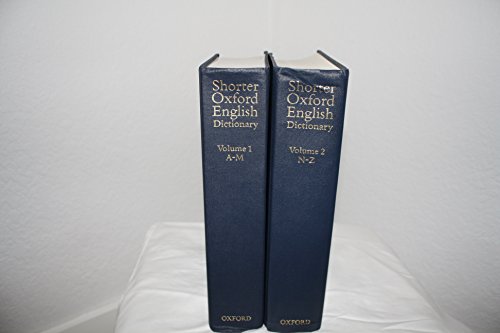


- THE NEW SHORTER OXFORD ENGLISH DICTIONARY UPDATE
- THE NEW SHORTER OXFORD ENGLISH DICTIONARY FULL
The Sixth Edition of the Shorter Oxford English Dictionary provides a complete update of this unique reference work. The Fifth Edition was published in 2002, and reverted to the name Shorter Oxford English Dictionary to emphasize the link between this 2-volume dictionary and the original 20-volume OED. It was the first complete revision of the dictionary, being in fact not so much an overhaul of the existing text as a reabridgement of the OED and its Supplements. The New Shorter was prepared under the editorship of Lesley Brown 1980-1993. The Third Edition (1944) contained an appendix of addenda and corrigenda, and this edition was reprinted several times with corrections and additions, the most significant being in 1973, with enlarged addenda (now running to over 70 pages) and a major revision of all the etymologies. The Second Edition, published in 1936, contained about 3,000 revisions and additions. The First Edition was published in 1933, in two volumes. He worked on it until his death in 1922, after which the dictionary was completed by H.

The first editor, William Little, was appointed in 1902.
THE NEW SHORTER OXFORD ENGLISH DICTIONARY FULL
From the beginning, the Shorter Oxford English Dictionary was intended to be an abridgement of the full Oxford English Dictionary.
English language - Etymology - DictionariesĬataloging source OCo Index no index present LC call number PE1625 LC item number. Label The new shorter Oxford English dictionary on historical principles Title The new shorter Oxford English dictionary on historical principles Statement of responsibility edited by Lesley Brown Title variation New shorter Oxford English dictionary Contributor The New Shorter offers a delightful introduction to the fruits of etymology, providing a fascinating guide to the evolution of language-for both scholars and those who need a practical aid to contemporary usage Understanding a word's history can help writers and speakers charge their language with nuance as well as precision. Words are a palimpsest: along with their current meanings, many words contain the shadows of their past definitions. The historical approach of The New Shorter offers a true feel for our rich, subtly textured language. Salinger ("Old Brossard was a bridge fiend, and he started looking around the dorm for a game"). The changing emphasis in the meaning of fiend, for instance, is shown by quotes ranging from Milton ("The Gates.belching outrageous flame.since the Fiend pass'd through") to J.D. Thousands upon thousands of changing meanings are followed through history, illustrated by more than 83,000 quotations, from Ben Franklin to Lord Byron, from Jane Austen to KazuoIshiguro. The New Shorter, however,offers something that no competitor can match: the historical, literary approach made justly famous by the OED. Each entry provides all the information you would expect from a leading unabridged dictionary: it identifies each word's various meanings, origins, part of speech, pronunciation (in the International Phonetic Alphabet), and combinations in which the word is often found, as well as cross-references to related words. Not strictly an abridgment of the OED, the New Shorter draws on the OED's ongoing revision as well as its own independent research program. This completely new dictionary covers virtually every word or phrase in use in English-worldwide-since 1700. Now, Oxford University Press is pleased to announce a landmark new dictionary-The New Shorter Oxford English Dictionary-that brings the authority of the Oxford Dictionary Department and the vast scholarship of the OED itself within the reach of individuals. 
For the past sixty-five years, the massive Oxford English Dictionary has offered the last word on the English language. Includes the history and etymology of thousands of words, 500,000 definitions, 25,250 variant spellings, and 83,000 illustrative quotations.








 0 kommentar(er)
0 kommentar(er)
